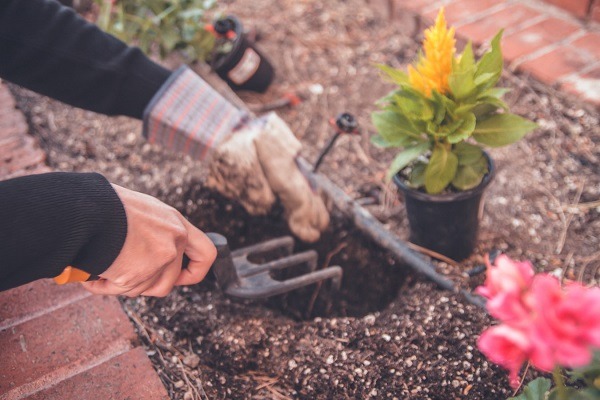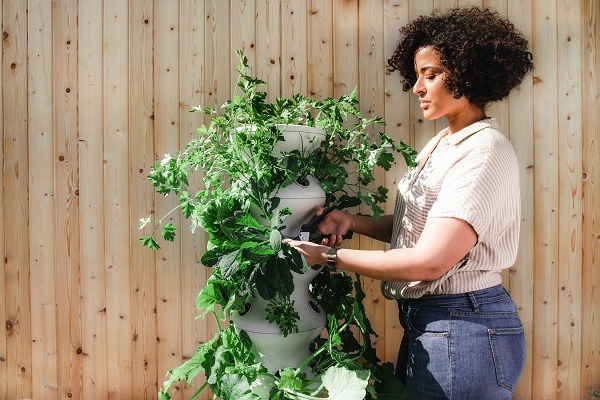Whether you are still at the beginning of your gardening journey, or you have had a garden for a while, you can always find new techniques and habits that will prove to be helpful to your gardening routine. The size of your garden does not matter as long as you are putting in the effort necessary to properly take care of your plants and the soil. Using these following tips, you are going to be a gardening pro in no time.
1. Make Compost
Any expert gardener knows that the best possible way to give your soil the nutrients needed is by adding natural fertilizer. You can make your very own fertilizer by making compost. Basically, do not throw away any organic waste that you have at home, especially vegetable and fruit waste. Instead, keep it in a compost bin, preferably outside or sealed off from the rest of your home to avoid any odors. Organic waste is amazing and has different nutrients that make your soil healthy thus helping your plants to thrive.
2. Use Compost or Fertilizer Properly
Making compost is easy. As mentioned above, you’re basically just keeping your organic waste in a separate bin. Using your compost properly is where the challenge comes in. There are different techniques you can utilize to ensure that your soil gets the nutrients it needs. For example, you can simply sprinkle the fertilizer on top of plant beds, or mix it into the soil in the beds. You can also gently rake the compost into tree beds, or you can simply spread it on top of your garden soil. Of course, to ensure that the fertilizer you use is well-incorporated into the soil, you need to have the proper tools. Experts at Harper Nurseries state that gardeners need to have certain tools in their gardening arsenal to be able to have the best routine possible. While, of course, you can use your hands for a lot of the tasks, having the right tools and gardening accessories can make a lot of difference.
3. Water Your Garden Properly
This may seem like an unnecessary tip since it is a given that plants need to be watered. However, not everyone knows how often plants need to be watered. As a pro, you need to do your research and set a schedule so that you can water each plant the appropriate amount and at the right time. At first, you might need to set reminders or check your schedule regularly. However, after a couple of weeks, you will have a routine that you won’t have to think twice about following.
4. Prune Shrubs and Bushes
This might not be a step that you need to add to your routine straight away if you are still starting out, but sooner or later, you will have to add this task to your gardening schedule. You do not have to go overboard when you are pruning the shrubs, bushes, or trees around your garden. You just need to make sure that they do not look messy and overgrown. Be sure to get the right garden supplies for this task.
5. Get Rid of Weeds
Weeds can pose a serious threat to your plants. Weeds are any kind of unwanted plant growth. Weeds act as a competitor for nutrients found in the soil that are meant to be used by the plants you planted in your garden. If you find weeds in your garden, you need to immediately get rid of them. There are three different ways people get rid of weeds. You can use a hoe to get rid of them, you can pull them out, or you can cut them off. Cutting them off ensures that your seedlings’ roots don’t get damaged when you are pulling the weeds out. You can also add mulch around your garden and watch for a while to see if any new growth comes through to find out if you have a weed-growth problem or not.
6. Check on Your Garden Daily
Even if you do not have any tasks to do around your garden for the day, make it a point to check on your garden. This will ensure that you can take immediate action if you notice something out of place or a threat to your plants. Checking on your garden daily also enables you to keep track of the progress your plants are making.
7. Protect Your Garden from Pests
Pests are a serious threat in any garden. They think of your garden as food, which means you need to constantly keep an eye on your plants to ensure that they are not damaged because of birds, insects, or snails. You can protect your plants from birds by putting wire mesh over them. Instead of using pesticides that could do more harm than good to your plants, you can set out mollusk traps and use natural insect deterrents.
8. Have the essential equipment
Even if you could spend a small lot on gardening supplies, you might not require them all. Every home gardener has to have a few fundamental necessities.
Wheelbarrow
Every gardener needs a nice wheelbarrow since it makes moving rocks, water, supplies, soil, and plants about your garden area much easier.
Dibber
As you plant your first garden of the season, a dibber, which creates planting holes for seeds, will save you a ton of time and effort.
Digging Spade
A digging spade is one of the most essential gardening equipment you may acquire. It is ideal for all tasks, including soil testing, planting, and anything else in between.
Garden Trowel
Garden trowels make it simpler to dig smaller holes and can assist you in carefully removing a plant to examine the root structure or transport it to another spot in your garden.
Garden Knife
A garden knife is an invaluable tool that no gardener should be without because it may be used to cut sticks, flowers, rope, and other things.
Heavy Duty Hoe
Whether hand tilling a small section of your garden or when digging up root vegetables like turnips, potatoes, and carrots, a decent, heavy-duty hoe may make quick work of the task.
Using these eight different tips, you can help make sure that your garden is top-notch. As mentioned above, you might need a little time to adjust to your advanced gardening routine, but it is going to be second nature when you have been at it for a while. Just remember to be consistent with your routine so that your garden thrives the way you want it to.


